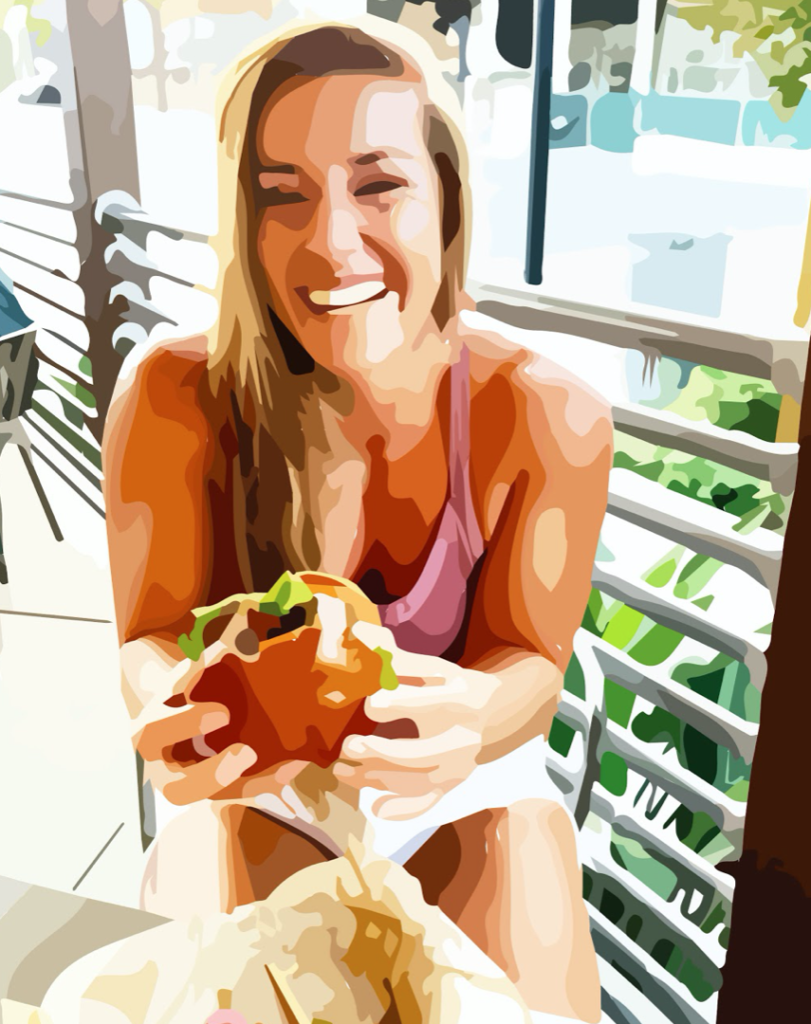
By Victoria Zambello
Executive Editor
“Nothing tastes as good as skinny feels.”
“Wow you can go a whole day without eating — that is self control.”
“If you take apple cider vinegar shots it’ll make you lose weight.”
“If you eat past 8 p.m. you’ll get fat.”
Raise your hand if you’ve ever felt personally victimized by diet culture.
From a young age, I was exposed to diet culture and, don’t be fooled, you were too. Ever seen the advertisement telling you that if you drink their product all day you will be able to “fit into” your prom dress? Diet culture itself dominates our world.
When I returned home from my study abroad experience, I thought to myself, what a perfect opportunity to lose the ‘extra’ weight I gained. I felt beyond insecure and wasn’t comfortable with the fact that my once athletic and lean body was becoming, in other words, a woman. I immediately took quarantine as a way to follow accounts on Instagram that promoted calorie deficiency and weight loss. I even took it upon myself to download a calorie counting app and everytime I ate something ‘healthy’ or low in calorie it would give me a smiley face. But, when I plugged in foods such as peanut butter, coconut water, or Wheat Thins, I would receive a red frowny face. I removed peanut butter from my diet. Everytime I went to grab Wheat Thins and hummus, I froze and remembered that I would feel the guilt of putting red frowny face food onto my app. Slowly, but surely, I pulled myself out of this cycle and began following accounts that promote healthy relationships with food, rather than viewing food as demonized.
“Way healthier than eating that kale is fixing your mindset surrounding you from what is stopping you from eating ice cream.”– Alexis Comeau ’21,
“On TikTok I saw that a girl had lost 10 pounds by drinking warm lemon water, cinnamon, and honey. She mixed it in a water bottle and drank it twice a day. So I religiously drank this twice a day. I was miserable,” said Jackie Ireland, Division I Soccer Alumni and Body Positivity Influencer in an email.
“Ninety-one percent of women who were surveyed on a college campus had tried to control their weight by dieting, and 22% of them dieted “often” or all the time,” according to Mirror Mirror, an eating disorder organization.
“I was at my leanest and I wasn’t even happy about it. I finally thought to myself, I am never going to be happy if this is all that I think about,” said Sam Gwaz, Lifestyle Coach and Nutritionist (MS CISSN CSCS), otherwise known as SamthePlan through a video interview.
How it starts
For me, it was the false diet fads mixed with meticulous attention to what types of foods I was putting in my body. This sprouted in an effort to enhance my sport performance then quickly turned into a common body obsession experienced by young girls and women wanting to be the leanest possible with the least amount of body fat. I stopped eating meat, focused on Tabata workouts, and tried to squeeze myself into smaller clothes. Monday through Friday I would constantly restrict myself just to binge on the weekends. But, this all changed when I came across an Instagram account called Samtheplan. I saw a photo of Sam devouring a burger and right away I thought ‘she can’t be fit’ – she is eating meat (yes, this is a disordered thought). I had stopped eating meat for mostly health reasons, believing in that moment I was making a positive decision.
A restrictive lifestyle is a toxic pattern that forces you to not think about what your body needs, but rather to manipulate your body: “I see it all the time with my clients and my friends where you just under assess your needs and you think you need less than you truly do and that stimulates the mindset of ‘I can’t have that I shouldn’t have that, etc., ’” said Gwaz.

We make the rules
Diet culture is filled with everyday habits and rules that we don’t even realize we make up. The key to removing yourself from diet culture is understanding that being healthy isn’t necessarily exactly what you eat, but your overall mindset around food, stress, and overall life is. “I can’t have bread, I’ve already had bread twice today…what? WHO made that up??” said Alexis Comeau ’21.”In reality, way healthier than eating that kale is fixing your mindset stopping you from eating that ice cream.”
Focusing our attention from how others are doing to how we are doing can remove ourselves from the common comparison game that diet culture promotes. “Disordered eating and exercise addiction are almost always because the individual is in pursuit to be THE best, THE fittest, rather than being THEIR best self,” said Nicole Adach, Mental Skills Coach at St. Michael’s College.
For Adach, self talk is something that she often uses for herself: “I’m having a constant conversation with myself all day, challenging my own narratives I have about food and what I taught myself to think and believe about foods,” Adach said.
For me, it is a mix of self talk and awareness from my inner circle of friends. I am beyond lucky to be surrounded by women who can recognize disordered thoughts and call me out quickly and productively. I have found a sense of both mental and physical strength, that has allowed me to fall in love with being strong without worrying about weight. Over the last six months, I have watched both my body and mindset change, from a girl who wanted to fit into diet culture by being the thinnest possible, to being a self-aware woman, who has fallen in love with being strong.
Raise your hand if you’re ready to cancel diet culture?

Victoria Zambello is the Executive Editor for The Defender. She is a Senior Media Studies, Journalism, and Digital Arts major with a minor in Sociology. She is an advocate for a balanced lifestyle and focuses on empowering others.

